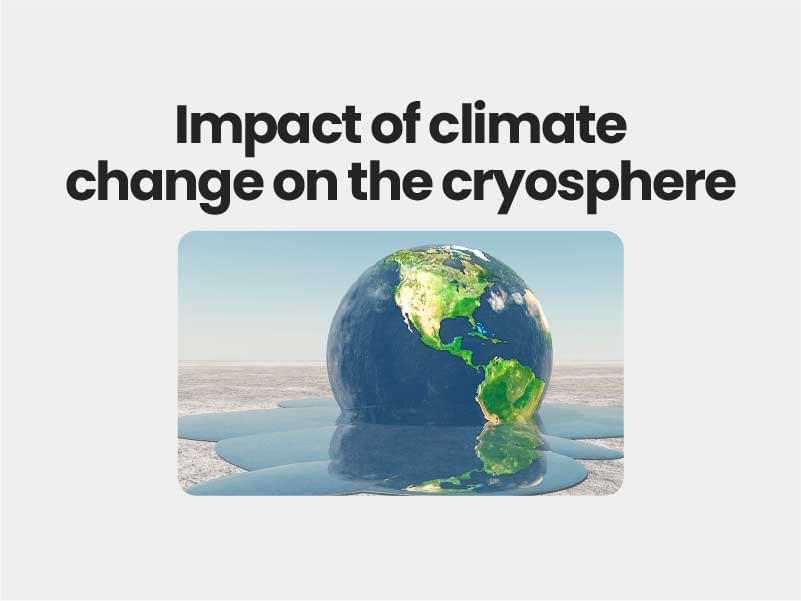Companion@360 → 7 Month programme to sharpen your writing skills → REGISTER NOW

Impact of climate change on the cryosphere
The cryosphere is a large and important component of our earth, which has a profound impact and in turn is hugely impacted by climate and climate change. The cryosphere comprises of the Earth’s ice – notably the Arctic, the Antarctic, and the world’s glaciers.
- Arctic sea ice began to decline around 1900, with a more accelerated ice loss since the 1950s.
- Since 1979, satellite records have confirmed an overall decline in summer sea ice coverage of around 13% per decade.
- Although fears that Arctic sea ice would reach a ‘tipping point’ and rapidly disappear currently seem to be unfounded, the mainstream view of scientists is that we will see ice-free summers in the Arctic Ocean within the next few decades.
- Process and Climate Change
Cryosphere process and climate change:
Objectives:
- To study the fundamental processes involved in the biogeochemical cycling (measurements of processes and factors influencing the same) within the snow packs as well as during the subsequent transformation to firn and ice in the polar and other region and elsewhere.
- To study the biotic components in the cryosphere responsible for meditating the exchange processes.
- To study the glaciological processes, accumulation patterns and snow layering characteristics for understanding the fundamental processes influencing the temporal records of ice.
- To reconstruct the environment variables like temperature, precipitation, aerosols, and sea ice conditions during the past 200-2000 years with annual to sub-annual resolution to better understand the recent climate change in polar/tropical region and their global teleconnections.
- To decipher the role of various internal and external forcing mechanisms on polar and global climate on a decadal centennial and millennial time scales.
Effects of Cryosphere on global climate:
- Water cycling
- Carbon trapping agents
- Maintaining global temperatures
IPCC’s Report
The IPCC prepares comprehensive Assessment Reports about the state of scientific, technical and socio-economic knowledge on climate change, its impacts and future risks, and options for reducing the rate at which climate change is taking place.
- However, IPCC does not conduct its own research.
- Global Warming of 1.5° C: A special report, which was commissioned to specifically explore the scientific feasibility of the 1.5°C goal set in the Paris Agreement, on global warming.
- The Assessment Report released by IPCC in 2014 was the 5th in a series of such reports.
- 6th Assessment Report of IPCC is expected to be released in 2022.
- The Intergovernmental Panel on Climate Change (IPCC) is the international body for assessing the science related to climate change.
- It was set up in 1988 by the World Meteorological Organization (WMO) and United Nations Environment Programme (UNEP) to provide policymakers with regular assessments of the scientific basis of climate change, its impacts and future risks, and options for adaptation and mitigation.
- IPCC assessments provide a scientific basis for governments at all levels to develop climate-related policies, and they underlie negotiations at the UN Climate Conference – the United Nations Framework Convention on Climate Change (UNFCCC).
Key findings:
- The Melting of Glaciers: The melting glaciers are the dominant source of sea-level rise, exceeding the effect of thermal expansion of ocean water (due to rising temperatures).
- Global Mean Sea-Level: It has increased by 16 cm between 1902 and 2015, and that the rate of increase had doubled of late.
- Ocean Warming: Global ocean has warmed unabated since 1970 and has taken up more than 90% of the excess heat in the climate system.
- Albedo of snow/ice sheet is high
Cryosphere has direct and indirect bearing on the global climate. Therefore, if we want to protect the biosphere then we must protect the Cryosphere.
